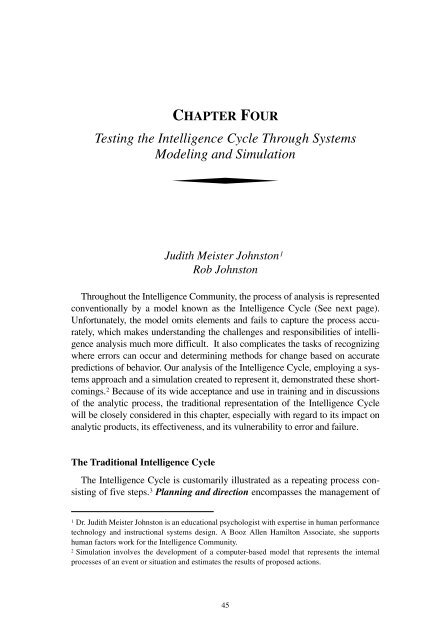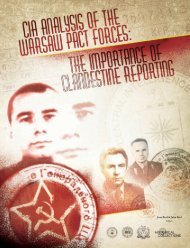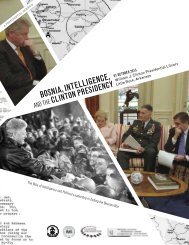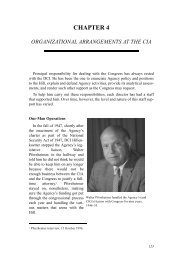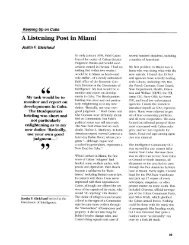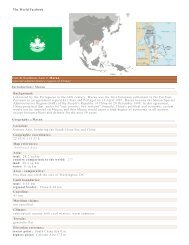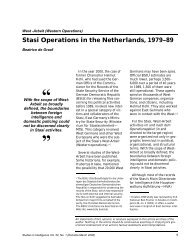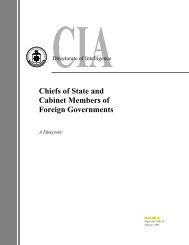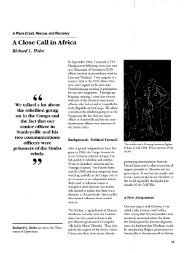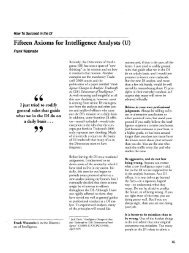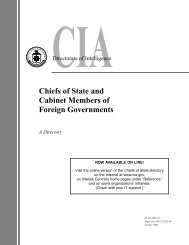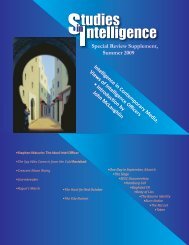Analytic Culture in the U.S. Intelligence Community (PDF) - CIA
Analytic Culture in the U.S. Intelligence Community (PDF) - CIA
Analytic Culture in the U.S. Intelligence Community (PDF) - CIA
Create successful ePaper yourself
Turn your PDF publications into a flip-book with our unique Google optimized e-Paper software.
CHAPTER FOUR<br />
Test<strong>in</strong>g <strong>the</strong> <strong>Intelligence</strong> Cycle Through Systems<br />
Model<strong>in</strong>g and Simulation<br />
Judith Meister Johnston 1<br />
Rob Johnston<br />
Throughout <strong>the</strong> <strong>Intelligence</strong> <strong>Community</strong>, <strong>the</strong> process of analysis is represented<br />
conventionally by a model known as <strong>the</strong> <strong>Intelligence</strong> Cycle (See next page).<br />
Unfortunately, <strong>the</strong> model omits elements and fails to capture <strong>the</strong> process accurately,<br />
which makes understand<strong>in</strong>g <strong>the</strong> challenges and responsibilities of <strong>in</strong>telligence<br />
analysis much more difficult. It also complicates <strong>the</strong> tasks of recogniz<strong>in</strong>g<br />
where errors can occur and determ<strong>in</strong><strong>in</strong>g methods for change based on accurate<br />
predictions of behavior. Our analysis of <strong>the</strong> <strong>Intelligence</strong> Cycle, employ<strong>in</strong>g a systems<br />
approach and a simulation created to represent it, demonstrated <strong>the</strong>se shortcom<strong>in</strong>gs.<br />
2 Because of its wide acceptance and use <strong>in</strong> tra<strong>in</strong><strong>in</strong>g and <strong>in</strong> discussions<br />
of <strong>the</strong> analytic process, <strong>the</strong> traditional representation of <strong>the</strong> <strong>Intelligence</strong> Cycle<br />
will be closely considered <strong>in</strong> this chapter, especially with regard to its impact on<br />
analytic products, its effectiveness, and its vulnerability to error and failure.<br />
The Traditional <strong>Intelligence</strong> Cycle<br />
The <strong>Intelligence</strong> Cycle is customarily illustrated as a repeat<strong>in</strong>g process consist<strong>in</strong>g<br />
of five steps. 3 Plann<strong>in</strong>g and direction encompasses <strong>the</strong> management of<br />
1<br />
Dr. Judith Meister Johnston is an educational psychologist with expertise <strong>in</strong> human performance<br />
technology and <strong>in</strong>structional systems design. A Booz Allen Hamilton Associate, she supports<br />
human factors work for <strong>the</strong> <strong>Intelligence</strong> <strong>Community</strong>.<br />
2<br />
Simulation <strong>in</strong>volves <strong>the</strong> development of a computer-based model that represents <strong>the</strong> <strong>in</strong>ternal<br />
processes of an event or situation and estimates <strong>the</strong> results of proposed actions.<br />
45


